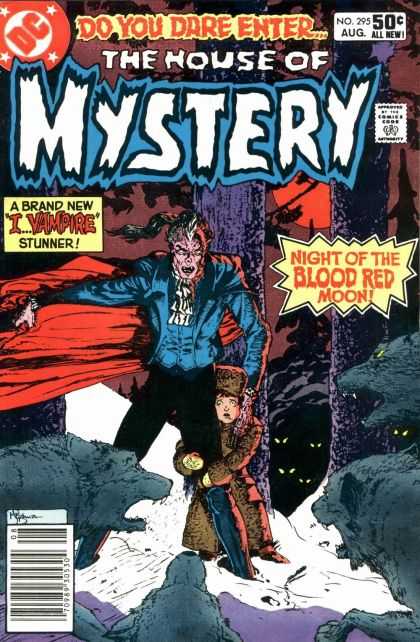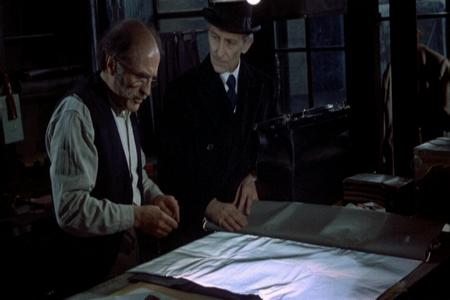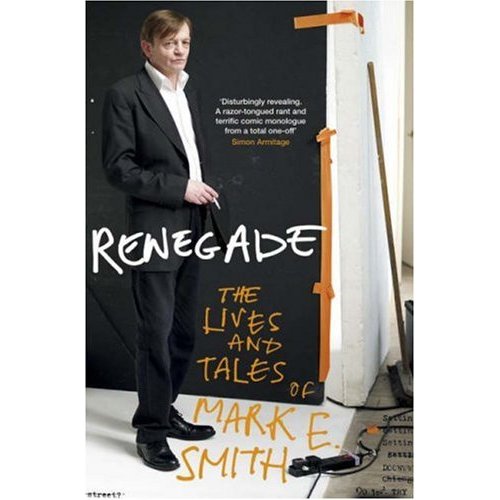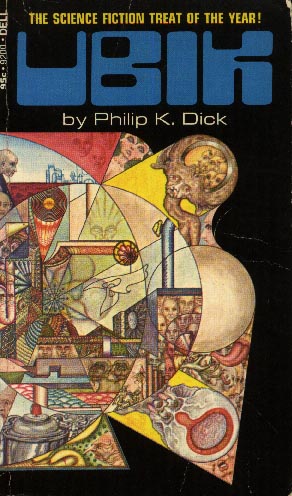The Place I Made The Purchase No Longer Exists
Tue. May 13, 2008Categories: Abstract Dynamics
(Being an unfinished version of the paper I was due to present at The Fall conference in Salford last Friday, but which I couldn’t attend due to family bereavement)

I keep bottles and comics stuffed by its head… Day by day The Moon gains on me
House Of Mystery cover from coverbrowser (thanks to Karl Kraft for the link)
Lets start with the line itself:
The place I made the purchase no longer exists.
Already, even taken in isolation like this, the line is charged with associations, generic rather than specific. You think, perhaps, of portmanteau Horror flicks of the type which used to centre on an antique shop. The shop, of course, is on some side street that you havent noticed before. But today you find yourself drawn to the slightly shabby street, already strangely deserted though it is still only mid afternoon. Something about the items in the window of the antique shop draws your attention: on the face of it, there is nothing terribly odd about the wooden and glass objects on display, but something about them does not feel quite right, in a way that is slightly ominous but also enticing. You enter: the door triggers a loud bell, but the owner does not appear from the back of the shop yet. Your misgivings multiply, but they are easily overwhelmed by a sense of fascination. You are entranced by one particular object – an ornate, ebony mirror, perhaps, or a squat idol – when youre shaken by a voice. The owners. He looks like Peter Cushing: kindly, eminently polite but with an edge of condescension and menace, an obsequious tempter. You are easily persuaded to buy the object to which you were drawn.
You leave. Things immediately go awry. You have to explain to what you laughingly call your loved one why you have bought home an object that is so
It makes them feel uneasy. They dont want it in the house. You turn on them angrily. All of the seething spite and resentment in your failing marriage becomes focused through the Thing. You must keep it. At night, you start to feel that the object is mutely watching you, sizing you up. As the days go on, your marriage finally disintegrates. Youre left on your own with the Thing. Its altering you, preparing the way for something terrible. Its going to make you into its puppet, to use you as its eyes. You dont want to look at it any more. You cover it with the dark sheet that the shopkeeper had wrapped it in. Sweating, delirious, you snap at strangers in the street who recoil aghast. You return to the street where the shop was situated. The same shabbiness. Except now there is no antiques shop. It doesnt look like there ever had been. The two nondescript houses that had been either side of the shop remain, but the place you made the purchase no longer exists. It isnt there, but the Thing this portal to the Outside remains. Its yours now, forever. There is nowhere to return it to.

You might call a story like that clichéd. But formulaic would be a better word. Variations of this formula were used, not only in portmanteau Horror films, but fiction anthologies (of the type which New English Library used to turn out), TV programmes (as varied as The Twilight Zone and Tales Of The Unexpected), and also comics (the old EC titles, and their later imitations, such as DCs House Of Mystery and Weird War).
The place I made the purchase no longer exists
When you hear the line, it carries all this with it. Superficially, you could construe it as an empty act of referencing, of postmodern playfulness, pastiche. Just a joke, a laff, commensurate with clip show conviviality. A knowing nod to what we used to watch from the End of History.
Sometimes The Fall have been heard in this spirit, increasingly so as the Mark E Smith persona has solidified, become a national treasure. Mark E Smith, the sort of no-nonsense bloke everyone would like to have a drink with. A fancied wit, still sharp, sarcastic – hed keep you on your toes – but at the end of the day, hes as pubbish and blokish as his one-time mentor John Peel, only with added prole cred. Mark E Smith, who gives his own life story to a culture in which biography has passively aggressively defanged fiction. See, we can explain it all now. True life tales. Nothing odd to see here.
This Mark E Smith is a doppelganger who has gradually all but replaced Mark E Smith the psychic and the schizophrenic, the righteous maelstrom, the dissonant vorticist transmitter who heard voices and spoke in tongues, the medium and media-channeler. The Mark E Smith who could make himself a riot of voices. People think of themselves too much as one person they dont know what to do with the other people that enter their heads.

Behind the autobiography, theres a Weird tale in itself. Or rather a tale about how the Weird ends up mired in the mundane. The Man Whose Head Diminished.
Smiths own fate looks like that of Romane Totale in reverse. If Totale was a cabaret entertainer become sorcerer, Smith is a lapsed sorcerer turned celebrated cabaret star, licensed fool on the BBC, licensed prole (in The Guardian). Totale was last seen in his Faery bunker, a tactical retreat that became a permanent exile, ritual facepaint devolving into Pierrot makeup dripping down his chin.
So R Totale dwells underground
Away from sickly grind
With ostrich headdress
Face a mess, covered in feathers
Orange red with blue black lines
And light blue plant heads
Smith foresaw it all, when he was still distilling televisionary psychic signals into Wyndham Lewis headline ticker-text. Foreseeing it, he told the same story many ways. At a certain point the powers will start to wane. The voices that speak through you will no longer make themselves heard. The words will not come. Your eyes will blink open and you will find yourself trapped in the most miserable reality, no longer able to make it take flight, or to yourself flee it. When all those egresses into other worlds recede, then this world will close around you, greasy with fried chicken fat, glossy with discarded celebrity trash, as seamless as a shopping mall, as interminable as a dreary videogame to which there is no level 2.
So now I sleep in ditches
And hide away from nosy kids
Smith the televisionary telepath foresaw it all, dreaded it, even as he could perhaps already feel it beginning even then. The signal coming through a scanner, increasingly dimly. So he flashed forward to these pictures of the maimed sorcerer-king become an addled old soak, mumbling stories for the amusement of laughing children. A gutted Icarus cast back to cursed earth, grounded in the gutter.
The wings rot and feather under me
The wings rot and curl right under me
After a while it will even seem to you that the derisive laughter is justified, that there was nothing there. That it was all a bit fanciful, that nothing really happened, or ever could.
The place I made the purchase no longer exists. When this line occurs, it is not a pallid act of citation, but an invocation and a triggering.
The formulas of Weird fiction function in a similar way they are repetitions that carry with them some of the power of previous iterations. These fictions about portals are themselves portals, connecting to other fictions, but also to other worlds. Sometimes it is difficult to know the difference, difficult to establish the precise point that a fiction becomes a world, or that a fiction infects and infests a world.
The notion of portals connecting worlds is crucial to the Weird, perhaps even definitional of it. As pre-eminent cases of Weird writers, lets call up Lovecraft and Philip K Dick. Lovecrafts innovation was to locate cosmic wonder and dread in his own New England backyard, and it was the juxtaposition of the abyssal and the quotidian that gave his fictions much of their thrilling charge. Ontological juxtaposition bring us close to the very essence of the Weird. There is no Weird-in-itself. The Weird, rather, consists precisely in the bringing together of Things which do not belong in the same place. The out of space and the out of time. This depends, of course, on a certain notion of what does belong: the ordinary world that will ultimately be invaded, its empiricist philosophy overthrown. The formal correlate of this ordinary world is a realism that will by the end of the tale be overwhelmed by a heightened cosmic delirialism, foaming with adjectives which, in their hyperbolic accretion, far from elucidating the weird object, make it more and more intractable.
What facilitates the aberrant mixes in Lovecrafts tales are thresholds, places of contact between this world and others. Sometimes these thresholds are literal, albeit mystical, doorways; but more often than not the threshold is a book.

Dicks fictions also turn upon the idea of multiple, incommensurate worlds. In Dicks case, more so than Lovecrafts, these worlds cannot be construed as different spaces, but as alternative realities, different ontological options. Viewed one way, these realities can appear to be epistemologically determined, the products of various technologies, influences or aptitudes hallucinogenic drugs, the media, fiction itself, precognition. But the conundra Dicks most powerful novels pose cannot be definitively resolved via any of these epistemological motivations. It is not the perception of reality that is warped in Dicks fictions; it is reality itself. Or, better, any notion of reality itself comes under threat, fractures into a multiplicity of worlds. As Brian McHale suggests in his Postmodernist Fiction, a text like Dicks Ubik is best understood in ontological terms, as a kind of equivalent in fiction of an Escher painting: a tangle of overlapping incompatibilities.
McHales analysis of postmodernist fiction places the notion of worlds worlds within worlds, worlds next door at its heart. This is where McHales account of postmodernist fiction crosses into the Weird as I have tried to outline it. But, whereas postmodernist fiction in its most anodyne and academic renditions ultimately collapses all worlds into texts, the Weird goes in the other direction: texts become worlds and portals between worlds. In Lovecraft, as I have already suggested, books open up holes in the mundane, points of weakness in the fabric of our world where outside forces can invade. For Lovecraft, make no mistake, there is no more dangerous activity than research. But where postmodernist fiction is usually associated with literary fiction, the Weird is typically disseminated in pulp formats: magazines, paperbacks, comics, TV, b-movies.
Mark E Smiths most distinctive texts echo both Lovecraft and Dicks methodology. According to caricature, The Fall proffer a naturalism whose dreariness is leavened only by its humour. But it was only in their earliest mode that The Fall were comic naturalists, introducing an amphetamine-driven garage punk to the bingo halls, industrial estates and cracker factories of Northern England. By the time of Dragnet, The Fall were seeing the same Northern vistas through the filter of Weird fiction. Manchester tenements were now haunted by Roman spectres. Ghostly figures follow you down the Salford streets. Impression Of J Temperance and Jawbone And The Air Rifle, from Grotesque and Hex Enduction Hour, compress Weird tales into a distorted, Northern rock. By now, Smith has repeated what Lovecraft had achieved relocating the bizarre and the anomalous in his own neighbourhood. It is precisely the disjunction between the Manchester estates that stick up like stacks and the hideous replicas and haunted jawbones which generates the effect of Weirdness. Taken as a whole, Grotesque and Hex Enduction Hour are themselves weird objects: unplaceable, intractable, they are confections of things which should not belong together.
Epilogue: The alternative afterlife of Roman Totale
Wandering through the franchise coffee bars in the reconstructed centre of Manchester the Arndale had been razed, his visions hadnt led him astray there – Totale tentatively fingers the wounds. Things have got very confusing since they put him on the anti-psychotics. Once he had thought that the abrasions were the scars left from a tentaclectomy, imposed on him by a psycho mafia who wanted to block his Faery revolution. He hoped to overthrow the sickly grind, dreamed that he could preside over a kingdom of the grotesque and aberrant: hobgoblins in the shopping centres, golems stalking the council estates. But he had been assured that this was all a particularly florid delusion. The marks all over his body had been the result of a nasty self-harming habit. But things were better now.
They told him to stay away from the secondhand bookshops, to watch TV in moderation, and then only the right kinds of programmes – about DIY, interior design, diet, these were harmless, in fact the doctor encouraged him to watch shows such as these, hoping, he said, that they would encourage Mr Totale to take more interest in his appearance, to look after himself properly. But even when Totale did lapse and go hunting for the, it was only the old programmes, the ones he found cycling round on the cable channels, that triggered anything, phantom flashes, breakthroughs in a grey room. It used to be that he could easily find the psychic channel, wherever it was. But the new stuff was the opposite of a portal: a bad mirror, its surface cold and unyielding, capturing him in the world of his reflection. It and the drugs made it so he could no longer see himself as he once had.
Fragments of a voice. Absurdly high pitched, smurf-like. Roman, Roman, dont you know youre dead?
Theres no way back. The place I made the purchase no longer exists